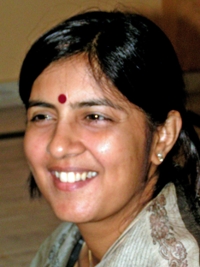Here is a short description of the speeches delivered by Sadhvi Mukhya Niyojika, Sadhvi Pramukha Shri and Yuvacharya Shri.
Anuvrat week was started on Sunday 22nd September 2008 at Anuvibha Bhavan Jaipur. Subsequently each day of the week to come was devoted to a specific subject like Science of Living, Environment, Coexistence, Anuvrat, Nonviolence etc. Today is Sunday and Anuvibha Bhavan, located in Jaipur is packed with audience who has come to listen and fully understand the discourses of Ahimsa day, the last day of Anuvrat week and crying need of the society worldwide. The program was well coordinated by Sri Pannalal Pugalia. Renowned people like Sri G.L. Nahar; Sri Karnawatji briefly spoke on the subject of the day.
Sadhvi Mukhya Niyojika Vishrut Vibha
She started her speech by quoting series of the deadly incidents, which occurred recently. For example:
- 13-year-old student shot two other students and killed them.
- A Korean student had killed a large number of people in nine minutes at the University of Virginia.
Hearing such fatal events, a Psychologist remarked that man’s emotions are dying and so he is moving towards violence.
At the University of California recent researches upon the causes of such incidents conclude that the student’s limbic system is getting imbalanced. Secondly children are getting aggressive because they are ignored by their parents and lacking love and affection.
She concluded her talk by saying that the present scene of violence should be changed through a regular practice of Anuvrat and Preksha Meditation.
Sadhvi Pramukha Kanak Prabha ji
Pramuka shri ji, the head nun of Jain Swetambar Terapanth sect graced the occasion and gave her valuable thoughts on Ahimsa (nonviolence).
Ahimsa and Anuvrat are interconnected, as they are incomplete without each other. Non-violence is the guiding force behind the principles of Anuvrat. She said, 'Nonviolence is considered as the highest virtue in all the major religions of the world. It is important to understand the root causes of violence from the scientific and theoretical perspectives. The seeds of violence and nonviolence both are present in the human mind. It depends which seed is nurtured to shape the personality.'
She further elaborated on nonviolence by quoting an example of George Bernard Shaw who thinks, it is good to appreciate beauty, but a display of beautiful flowers and plants for decoration are representing violence.
She continued, 'Today there is a need of change of heart. Fear and punishment do not make any one non-violent. Negative thinking and negative action is all violence.'
Yuvacharya Mahashraman ji
Yuvacharya Shri Mahashraman ji, quoting from Jain Agamas explained nonviolence as follows, ' Non-violence is that which is beneficial for all living creatures of the world. Where there is non-violence there is peace. Air, water and fire all have minute living creatures so they should be used with mindfulness.'According to him, today in the whole world the scenario of violence is taking place in three different areas:
- money
- sex
- power
Reasons for violence are:
- Ignorance
A child hits a sleeping dog in his ignorance.- Helplessness
A hungry man cannot live for long so he indulges in violence for his survival.- Anger
Man has information on violence but has no control on his anger.- Household
Conflicts between husband and wife can lead to violence.Thus his message is to live the life of 'Good Man' and to develop positive emotions like amity for all, tolerance to all situations, compassion with every living creature.
The session was concluded with the recitation of Mangal Path by Yuvacharyashriji.
 Shivani Bothra
Shivani Bothra